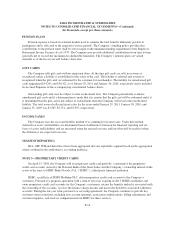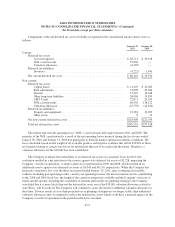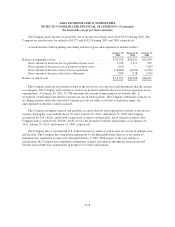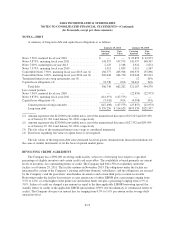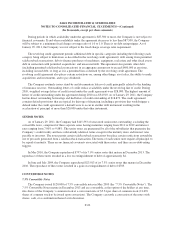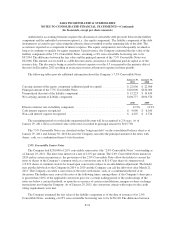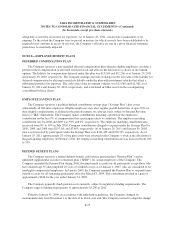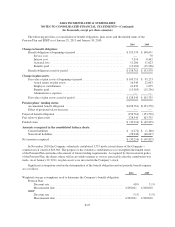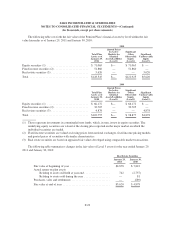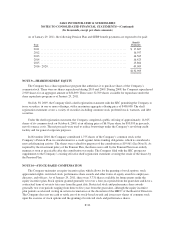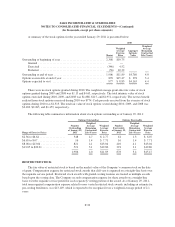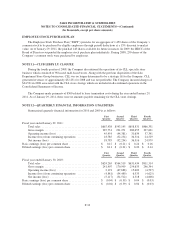Saks Fifth Avenue 2010 Annual Report Download - page 74
Download and view the complete annual report
Please find page 74 of the 2010 Saks Fifth Avenue annual report below. You can navigate through the pages in the report by either clicking on the pages listed below, or by using the keyword search tool below to find specific information within the annual report.SAKS INCORPORATED & SUBSIDIARIES
NOTES TO CONSOLIDATED FINANCIAL STATEMENTS—(Continued)
(In thousands, except per share amounts)
As of January 29, 2011, the Company had two potential commitments tied to the value of its common stock.
First, the Company may be required to deliver shares and/or cash to holders of the convertible notes described in
Note 6 prior to the stated maturity date of said notes based on the value of the Company’s common stock.
Second, in connection with the issuance of the convertible notes, the Company bought and sold call options to
limit the potential dilution from conversion of the notes. The Company may be required to deliver shares and/or
cash to the holders of the call options based on the value of the Company’s common stock.
In the normal course of business, the Company purchases merchandise under purchase commitments; enters
into contractual commitments with real estate developers and construction companies for new store construction
and store remodeling; and maintains contracts for various information technology, telecommunications,
maintenance and other services. Commitments for purchasing merchandise generally do not extend beyond six
months and may be cancelable several weeks prior to the vendor shipping the merchandise. Contractual
commitments for the construction and remodeling of stores are typically lump sum or cost plus construction
contracts. Contracts to purchase various services are generally less than one to two year commitments and are
cancelable within several weeks notice.
From time to time the Company has issued guarantees to landlords under leases of stores operated by its
subsidiaries. Certain of these stores were sold in connection with the Saks Department Store Group and the
Northern Department Store Group transactions which occurred in July 2005 and March 2006, respectively. If the
purchasers fail to perform certain obligations under the leases guaranteed by the Company, the Company could
have obligations to landlords under such guarantees. Based on the information currently available, management
does not believe that its potential obligations under these lease guarantees would be material.
LEGAL CONTINGENCIES
On February 2, 2011, the plaintiffs in Dawn Till and Mary Josephs v. Saks Incorporated et al, filed a
complaint, with which the Company was served on March 10, 2011, in a purported class and collective action in
the U.S. District Court for the Northern District of California. The complaint alleges that the plaintiffs were
improperly classified as exempt from the overtime pay requirements of the Fair Labor Standards Act (“FLSA”)
and the California Labor Code and that the Company failed to pay overtime, provide itemized wage statements
and provide meal and rest periods. On March 8, 2011, the plaintiffs filed an amended complaint adding a claim
for penalties under the California Private Attorneys General Act of 2004. The plaintiffs seek to proceed
collectively under the FLSA and as a class under the California statutes on behalf of individuals who have been
employed by OFF 5TH as Selling and Service Managers, Merchandise Team Managers, or Department
Managers. The Company believes that its managers at OFF 5TH have been properly classified as exempt under
both Federal and state law and intends to defend the lawsuit vigorously. It is not possible to predict whether the
court will permit this action to proceed collectively or as a class.
In addition to the litigation described in the preceding paragraph, the Company is involved in legal
proceedings arising from its normal business activities and has accruals for losses where appropriate.
Management believes that none of these legal proceedings will have a material adverse effect on the Company’s
consolidated financial position, results of operations, or liquidity.
INCOME TAXES
The Company is routinely under examination by federal, state or local taxing authorities in the areas of
income taxes and the remittance of sales and use taxes. These examinations include questioning the timing and
amount of deductions, the allocation of income among various tax jurisdictions and compliance with federal,
state and local tax laws. Based on annual evaluations of tax filing positions, the Company believes it has
F-24


